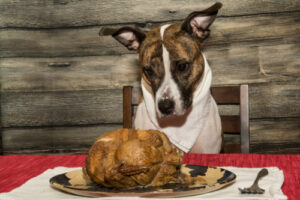Bone broth has become a popular supplement for dogs, touted for its potential health benefits. As pet owners seek ways to enhance their dog’s diet, a question may arise: Is bone broth good for dogs? In this blog, we’ll explore what bone broth is, its benefits, how to safely introduce it to your dog’s diet, and the best ways to incorporate it into their meals. For personalized advice and to ensure it suits your pet’s needs, please call Best Friends Animal Hospital in Manchester, NH, at (603) 625-2378.
What Is Bone Broth?
Bone broth is a nutrient-rich liquid made by simmering bones and connective tissues of animals, such as chickens, cows, or fish, for an extended period. This process extracts valuable nutrients, including collagen, gelatin, vitamins, and minerals, making bone broth a potentially beneficial supplement for dogs.
The Nutrient Profile of Bone Broth
Bone broth is packed with essential nutrients that can support your dog’s overall health. Key components include:
- Collagen and Gelatin: These proteins support joint health and aid in digestion.
- Amino Acids: Vital for muscle repair and immune function.
- Minerals: Such as calcium, magnesium, and phosphorus, which are crucial for bone health.
- Vitamins: Including vitamins A and K2, contributing to eye and bone health.
Understanding these nutrients helps clarify why bone broth might be a valuable addition to your dog’s diet.
Health Benefits of Bone Broth for Dogs
Bone broth offers several potential health benefits for dogs, making it a popular choice among pet owners looking to improve their dog’s diet.
Joint Health
The collagen and gelatin in bone broth can help maintain healthy joints. These proteins provide the building blocks for cartilage, which cushions joints and supports mobility. Adding bone broth to your dog’s diet might alleviate discomfort in older dogs or those with arthritis.
Digestive Health
Bone broth is gentle on the stomach and can support a healthy digestive system. The gelatin helps seal the gut lining, reducing the risk of leaky gut syndrome. This can be especially beneficial for dogs with sensitive stomachs or food allergies.
Immune Support
The amino acids and minerals in bone broth can boost your dog’s immune system. A strong immune system is essential for fighting off infections and maintaining overall health. Bone broth can serve as a natural, nutrient-rich supplement to bolster your dog’s defenses.
Hydration
Bone broth is a flavorful way to increase your dog’s fluid intake. Staying hydrated is crucial for overall health, and some dogs may be more inclined to drink bone broth than plain water, especially during hot weather or after strenuous activity.
How to Safely Introduce Bone Broth to Your Dog’s Diet
While bone broth can be a beneficial supplement, it’s essential to introduce it properly to ensure your dog’s safety and health.
- Choosing the Right Bone Broth: Select a bone broth specifically made for pets or one with no added salt, onions, garlic, or other harmful ingredients. Always read the labels carefully to ensure the broth is safe for canine consumption.
- Starting Slowly: Begin by offering your dog a small amount of bone broth to see how they react. Gradually increase the quantity as their digestive system adjusts. This slow introduction helps prevent any potential stomach upset.
- Serving Suggestions: You can serve bone broth on its own, mix it with your dog’s regular food, or freeze it into ice cubes for a refreshing treat. These methods make it easy to incorporate bone broth into your dog’s diet in a way that suits their preferences.
Potential Concerns and Precautions
While bone broth can be beneficial, it’s essential to be aware of potential concerns and take necessary precautions.
Allergies and Sensitivities
Some dogs may have allergies or sensitivities to certain ingredients in bone broth. Monitor your dog for any signs of allergic reactions, such as itching, swelling, or digestive issues, and discontinue use if any adverse reactions occur.
Sodium Content
High sodium levels can be harmful to dogs, leading to issues such as dehydration or high blood pressure. Ensure the bone broth you choose is low in sodium or specifically formulated for pets to avoid these risks.
Incorporating Bone Broth into Your Dog’s Diet
Bone broth can be a versatile addition to your dog’s meals, offering both nutritional benefits and an enhanced flavor profile.
- Enhancing Dry Food: Pouring bone broth over dry kibble can soften the food, making it more palatable and easier to digest. This method is especially useful for older dogs with dental issues or those who are picky eaters.
- Homemade Meals: If you prepare homemade meals for your dog, bone broth can serve as a nutrient-rich base. It adds flavor and moisture, ensuring your dog’s meals are both delicious and nutritious.
- Treats and Snacks: Freezing bone broth into ice cubes or adding it to homemade dog treats can provide a refreshing and healthy snack. These treats are especially enjoyable during hot weather, offering hydration and nutrition in one.
Is Bone Broth Good for Dogs?
Incorporating bone broth into your dog’s diet can offer numerous health benefits, from improved joint and digestive health to enhanced hydration and immune support. However, it’s essential to choose the right product, introduce it gradually, and monitor for any adverse reactions. For personalized advice tailored to your dog’s specific needs, please call Best Friends Animal Hospital in Manchester, NH, at (603) 625-2378. Our team is here to help you ensure your pet’s diet supports their overall well-being and happiness.





